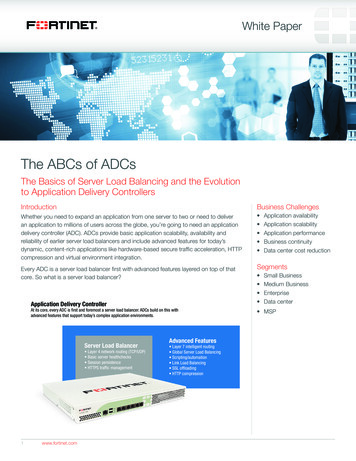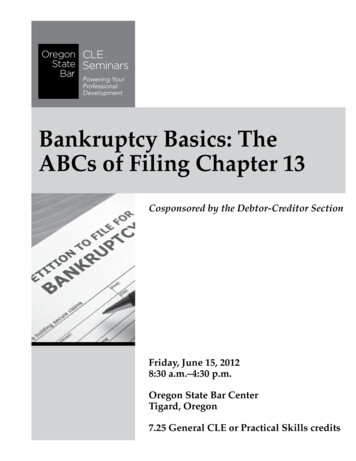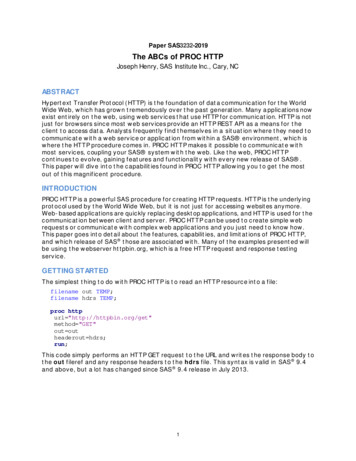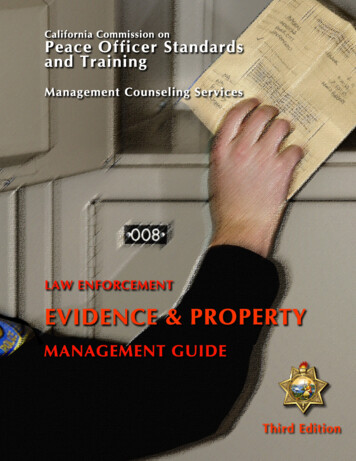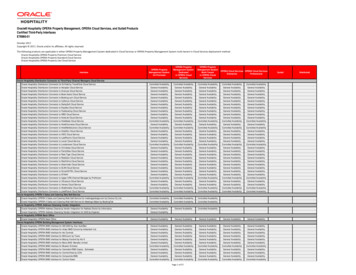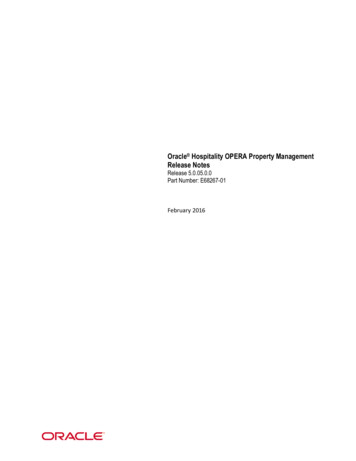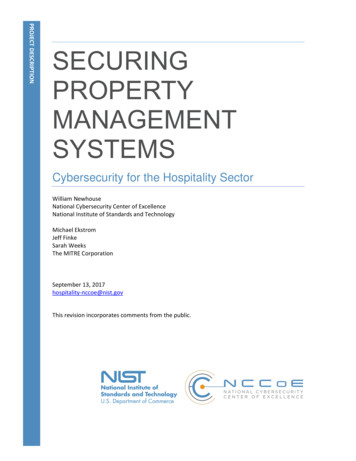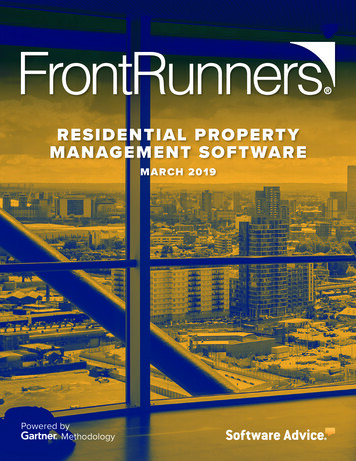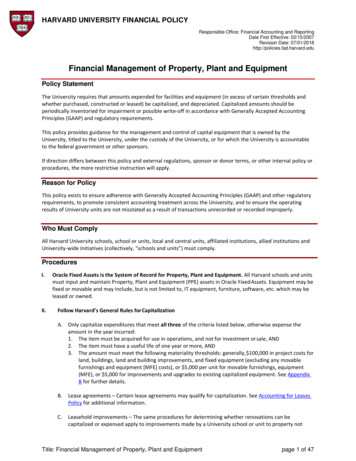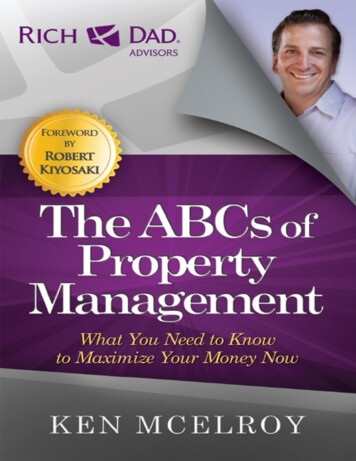
Transcription
If you purchase this book without a cover you should be aware that this book may have been stolen propertyand reported as “unsold and destroyed” to the publisher. In such case neither the author nor the publisherhas received any payment for this “stripped book.”This publication is designed to provide competent and reliable information regarding the subject mattercovered. However, it is sold with the understanding that the author and publisher are not engaged inrendering legal, financial, or other professional advice. Laws and practices often vary from state to state andcountry to country and if legal or other expert assistance is required, the services of a professional should besought. The author and publisher specifically disclaim any liability that is incurred from the use orapplication of the contents of this book.Copyright 2008, 2014 by Ken McElroy. All rights reserved. Except as permitted under the U.S.Copyright Act of 1976, no part of this publication may be reproduced, distributed, or transmitted in anyform or by any means or stored in a database or retrieval system, without the prior written permission of thepublisher.Published by RDA PressRich Dad Advisors, B-I Triangle, CASHFLOW Quadrant and other Rich Dad marks are registeredtrademarks of CASHFLOW Technologies, Inc.RDA Press LLC15170 N. Hayden RoadScottsdale, AZ 85260480-998-5400Visit our Web sites: RDAPress.com and RichDadAdvisors.comFirst Edition: May 2008First RDA Press Edition: October 2014Cover Design by Chris Collins American Design Co.ISBN: 978-1-937832-54-4102014
This Book is Dedicated to The Mckenzie Monks FoundationHelping Kids Cope With Cancerwww.MckenzieMonksFoundation.org
Contents Foreword by Robert KiyosakiIntroductionSection 1: Should I Manage My Own Property or Hire Someone to Do It forMe?Chapter 1 Size Doesn’t MatterChapter 2 Property Management SystemsChapter 3 Cash Flow ManagementChapter 4 A Month in the Life of an Owner-ManagerSection 2: How Do I Find a Good Property Manager?Chapter 5 Not All Property Management Companies Are Created EqualChapter 6 Employees, Systems, and Structures: The Backbone of aCompanySection 3: How Do I Hire a Good Property Manager?Chapter 7 Hiring a Good Property Manager or Management CompanyConclusionResourcesAbout the Author
Forewordby Robert KiyosakiThis book has been a long time coming. When I wrote Rich Dad Poor Dad in2000, I said that a great property manager was the key to success in real estateinvesting. The reason for this is that great property managers create value. That’sbecause value, when it comes to investment real estate, is not only a function ofmarkets, but it also impacts your bottom line. Your real estate is only as valuableas your renters think it is—what they are willing to pay in rent. Rental income isultimately the aspect of real estate you have the most control over. (And thus it’sthe aspect that presents the greatest opportunity for failure as well.)Property managers are valuable members of your team because theyspecialize in your real estate market, and they know how to maximize yourinvestment’s income-producing potential.Thankfully, I’m smart enough to follow my own advice. That is why Isought out Ken McElroy to be an advisor to me on real estate investing andproperty management. Ken is an expert on both. His company owns andmanages thousands of apartments across the United States. His knowledge andexperience adds incredible value to my team.That is also why Ken was the only option when we decided to offer a bookon property management. You may already be familiar with Ken and his work.Perhaps you’ve seen him speak at a Rich Dad seminar, or maybe you’ve read hisbest-selling books, The ABCs of Real Estate Investing and The Advanced Guideto Real Estate Investing. And while Ken is an undeniable expert on the businessof real estate investing, I’m sure he will tell you that his first love and ultimateexpertise is property management—that is, creating value. In the end, it’s whatsets Ken far ahead of the pack. And as he will tell you, it’s the key to what madehim the successful investor and businessman that he is today.While Ken’s previous books were tremendous guides for how to invest inreal estate, this book may be the most important book Ken has written for the
Rich Dad Company. Finding quality real estate deals to invest in is easy.Sustaining those investments and creating value for those investments isanything but. It takes a keen eye and management knowhow, something manyinvestors lack.Property management is a long-term proposition. Finding, buying, andselling real estate is a relatively short process. In my experience, most real estateinvestors are taken off guard by the blood, sweat, and tears that go intoeffectively managing a property. And as Ken will show you, your preconceivednotions of what it takes to be a great property manager are most likely the stuffof fantasy.But in order to become a truly great real estate investor, you need a thoroughunderstanding of the principles of sound property management, the exceptionallylarge amounts of time and energy it takes to manage a property effectively, andthe ways in which great property management can bring value to yourinvestments.So if you’re ready to take your real estate investing to the next level, thisbook is for you. It will be an invaluable resource. You will learn all these thingsand more. Most important, you will learn them from someone I consider to benot only a good friend and valuable business advisor, but also the expert on thebusiness of property management and value creation.Robert Kiyosaki
IntroductionA Jumbo ProblemJumbo had parked his wheelchair behind some landscaping in the courtyard toprovide cover. The sweltering Phoenix heat was in full force, and beads of sweatrolled down his face as he sat and listened in silent tension. Slowly his handmoved down to the compartment on his wheelchair where he kept hissemiautomatic. With practiced precision, he flipped the safety off and waited.The Phoenix police had set up a perimeter around the building.“Don’t make this any harder on yourself, Jumbo!” the police negotiatorcalled out over the bullhorn, his voice breaking eerily through the silence andechoing off the building walls. “You’re not getting out of this. We’ve got thewhole building covered. Just come on out and let us take you in. Nice and easy.”Silence fell over the courtyard again, pierced only by the occasional buzzingof a fly or the passing of a random car. Jumbo knew he was in serious trouble.Finally, Jumbo spoke.“Screw—you!” he yelled out.And with that Jumbo’s hands reached for his wheels, and he raced offthrough the apartment building and down the courtyard path. It didn’t take longfor the police to catch up to him. In one swift move the police had knocked overhis wheelchair and had Jumbo in cuffs. Just as quickly as it had begun, thestandoff was over. When the police found the semiautomatic and the drugs, itwas obvious how much worse the situation could have been.This story may seem like something out of a crime fiction novel, but storieslike this happen every day and are often great dinner conversation for theproperty management industry. The owner of this property was a personal friendwho had turned to my company for help, as he was facing foreclosure.The building had sub-par residents, many with criminal backgrounds, whowere allowed to move in. These residents were basically running the place byselling drugs and running prostitution rings. The property was unsafe, which was
driving all the good residents out. And because most of the residents weren’tquality residents, most of the rents weren’t paid on time. In fact, the revenues forthe property slipped so low because of vacancy and nonpayment that most of thenormal bills, including the mortgage, couldn’t be paid. The owner was in direstraits.Jumbo was just one of those seedy residents allowed to move into thebuilding. He was a known drug dealer with a criminal background who waswheelchair-bound because of crippling gunshot wounds from a previous drugdeal gone bad.This was just one of many examples and an all-too-real reminder that thelack of good property management can put any investment in jeopardy.In the end, Jumbo was just the tip of the iceberg when it came to thisbuilding. It was full of criminal activity and unruly sorts. In fact, one of the mainreasons Jumbo was caught by the police was that there were so many police callsto the property address that the property was a huge liability to the surroundingneighborhood. Therefore, with our cooperation, the local police set up a policesubstation at the property management office and started a surveillance operationfrom some of the vacant apartments.I tell you this story not simply because of its shock value, but to dispel themyth that property management is a dull, no-brainer job. It’s anything but! Asyou read this book, you will hear many stories that you may not have expected—or, if you have been managing property for a while, they may seem all toofamiliar. The number one job of a property manager is dealing with residents,and the number one rule of dealing with residents is that there are no rules. Anytime you take hundreds of people with diverse backgrounds, personalities, andmotivations, you have a recipe for the unexpected. The amazing thing aboutJumbo’s story is that it isn’t even shocking to me anymore.Any way you slice it, property management is a down-and-dirty job. But ifit’s done correctly it can add incredible value to your investment. I know thisbecause I’ve been doing it for over 25 years, and have seen firsthand the powerof property management done right.And after over 25 years in the property management business, there is onething I can assure you:
Rich Dad TipPoor Management Poor ProfitBy the way, and this should not be too much of a surprise to you; poormanagement in almost every business usually equals poor profit, not just inproperty management. I am sure you can relate.One of the main reasons businesses fail is due to poor management, period.Have you ever been somewhere and had terrible service? Perhaps a restaurant, ahotel, an automotive shop, or a retail cashier? In most cases, you would never goback to that place of business. Well, don’t think you are unique in thatexperience. The beauty of all this is that for every failing business there issomeone in denial or an ego that is directly responsible. The facts are usually thesame: high turnover, poor training, and poor service.I think of these people and businesses as donors to your financial future, andthat’s how I look at poorly managed properties.Here’s the StoryThis book is not just about how to manage property or find a good propertymanager. Though it covers those things, it’s also about stories. Every propertyhas a story or stories that tell you as much about what management will be likeas the financial statement will.Many people are surprised when I tell them that a financial statement can tella story, but it’s true. Numbers are the universal language, and once you learnhow to read them fluently you will be able to see patterns that will give you avery clear picture of the way a property is being managed. I can look at anyfinancial statement for any building and in a matter of minutes be able todetermine what is being done right and what is being done wrong in managingthat building. I can tell whether rents should be raised, or even more specificallyif the property is suffering from poor customer service. This book will teach youto listen to professionals in the property management business no different thanyou would any other service, and to learn from the stories others and ultimatelyyour financials will tell you about your investment.The beauty of managing property is that you don’t have to settle for the story
as it is. Rather, you can create the story as you see fit through sound principles.Do you have a property that is filled with problems and riffraff? You can rewritethat story; otherwise it will continue to write itself in the same way. Ultimately,the choices you make in managing your property will determine your profit.Much as I am writing this book, choosing what direction it will go, whatwords to use, and what I wish to tell you, you have the power of changing thestory of your properties and creating a chariot out of a pumpkin if you listen andlearn from other property managers, learn how to read your financialsthoroughly, and apply the principles you have learned. So, let me tell you mystory.I’ll just get this out on the table: I wasn’t planning on doing propertymanagement for a living. I jumped at the free rent. I thought the job would beeasy and something to do while I was studying for my real estate license. Inother words, I stumbled into it. A lot of people do.My first job out of college was managing a sixty-unit building where I bothlived and worked. It was my first job out of college. It turned out to be a biggerjob than I ever could have imagined. I was the only staff on-site and responsiblefor the collection of rent, leasing of units, all the maintenance, residentcommunications, and enforcement of rules and regulations. For this I received asalary of 600 per month and a free one-bedroom apartment. Rents at that timewere running around 300 per month for a one-bedroom, so all said and done, Iwas making less than 1,000 per month.Coming out of college with a mountain of debt due to college loans andnever really making any money, I thought it was a great deal. You may not becoming right out of college, but chances are when it comes to propertymanagement, you’re as naive as I was. “How hard can collecting a few rentsbe?” I thought to myself. My education was just about to begin.As is the case with most young adults coming out of the American educationsystem, with a degree I could hang on my wall, I had no real practicalknowledge and absolutely no financial education. So,
Robert Kiyosaki. Introduction A Jumbo Problem Jumbo had parked his wheelchair behind some landscaping in the courtyard to provide cover. The sweltering Phoenix heat was in full force, and beads of sweat rolled down his face as he sat and listened in silent tension. Slowly his hand moved down to the compartment on his wheelchair where he kept his semiautomatic. With practiced precision, he .
